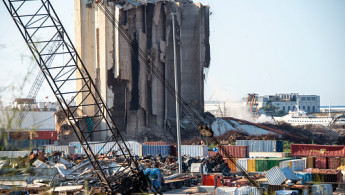Beirut Port Explosion 4th anniversary marked amid 'delayed justice'
The fourth anniversary of the Beirut port explosion is being marked for another year by ongoing frustration and grief, as the Lebanese authorities continue to hinder the investigation and evade accountability.
Despite international organizations documenting failures and mistakes by officials, no one has been held responsible for what has been dubbed the "crime of the century."
Since February 2023, the investigation has been at a standstill. Judge Tarek Bitar, the lead investigator, remains sidelined, and the new Prosecutor General, Judge Jamal Hajjar, has yet to take action following his predecessor Judge Ghassan Oueidat's charge against Bitar for "usurpation of power."
Judge Oueidat's actions were in response to Bitar's resumption of investigations on January 23, 2023, during which he released five detainees and charged eight new individuals, including Oueidat himself, other judges, and security leaders. Oueidat subsequently ordered all security agencies to ignore Bitar’s decisions, released all detainees, and imposed a travel ban on them. One of the released detainees, Mohammad Ziad Alouf, who holds U.S. citizenship, immediately left for the United States via Beirut International Airport.
The victims' families continue to demand justice, regularly staging protests despite the country's numerous challenges.
Marianne Fazolian, the sister of victim Gaia, told The New Arab's sister publication Al-Araby Al-Jadeed that they seek full accountability and justice. She stressed that the August 4 explosion was a crime of negligence, as officials knowingly stored dangerous ammonium nitrate in the heart of Beirut.
Fazolian called on the new Prosecutor General to reverse Oueidat's decision, allowing Bitar to complete his investigation and issue an indictment to refer the responsible parties to the judiciary.
Youssef Lahoud, a lawyer representing the Beirut Bar Association in the explosion case, highlighted that the legal obstacles have been removed, but administrative hurdles persist.
Oueidat’s administrative decision prevents the judicial police from cooperating with Bitar, effectively stalling the investigation. Lahoud emphasized that the Bar Association has requested the Prosecutor General’s office to rescind this decision to allow the investigation to proceed.
Lahoud pointed out the importance of issuing an indictment, which would address many unanswered questions, such as the cause of the explosion and whether it was intentional.
Amnesty International's Lebanon researcher, Sahr Mandour, criticized the authorities for undermining the investigation and evading accountability. She called for the UN to establish an international fact-finding mission to investigate the explosion, given the paralysis of the domestic investigation.
Mandour stated that the complete halt in the investigation over the past two years reflects a political system resistant to accountability, regardless of the magnitude of the tragedy, because the continued stalling sends a message to both the Lebanese public and the international community that those in power are above the law.





 Follow the Middle East's top stories in English at The New Arab on Google News
Follow the Middle East's top stories in English at The New Arab on Google News


